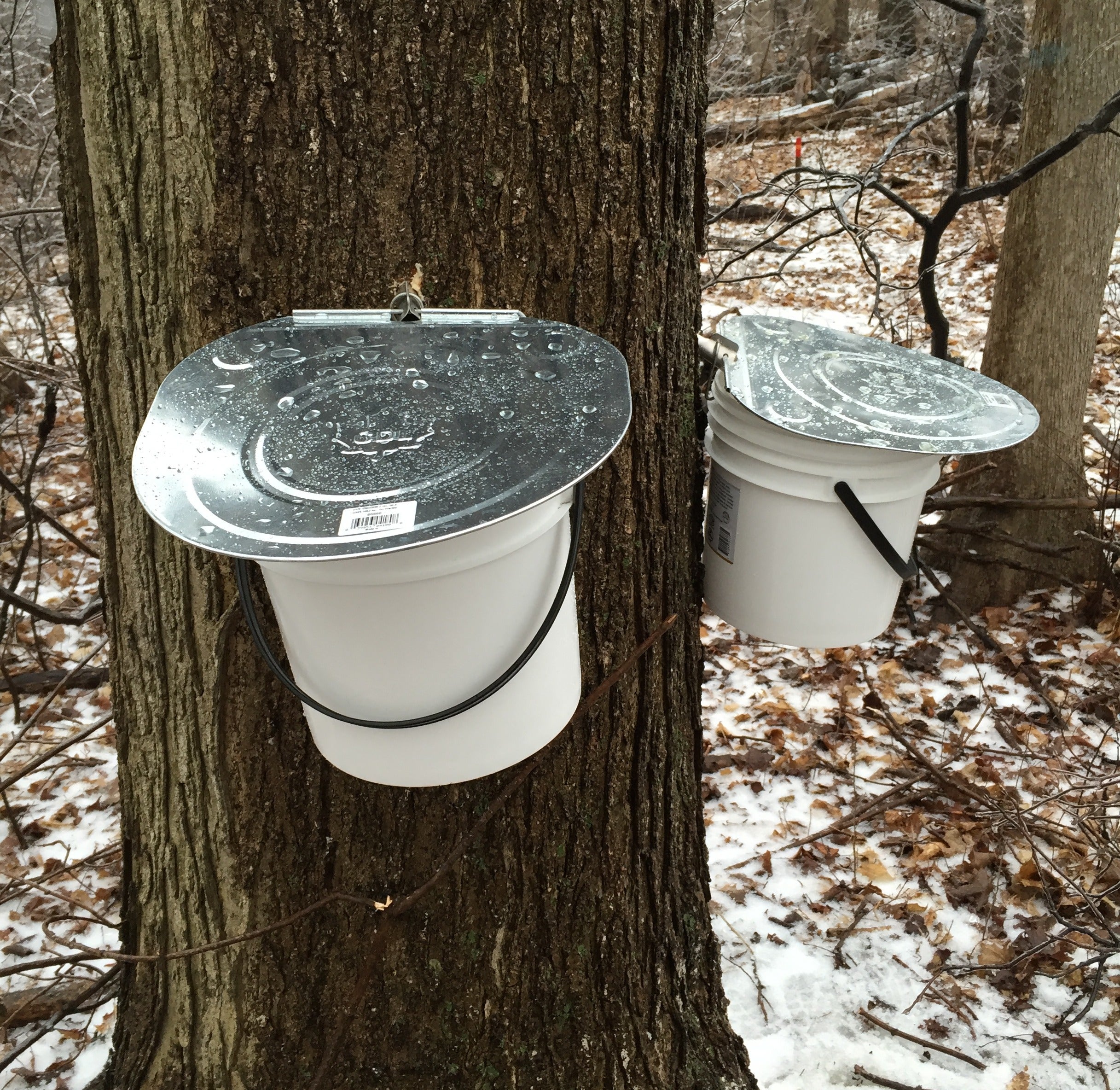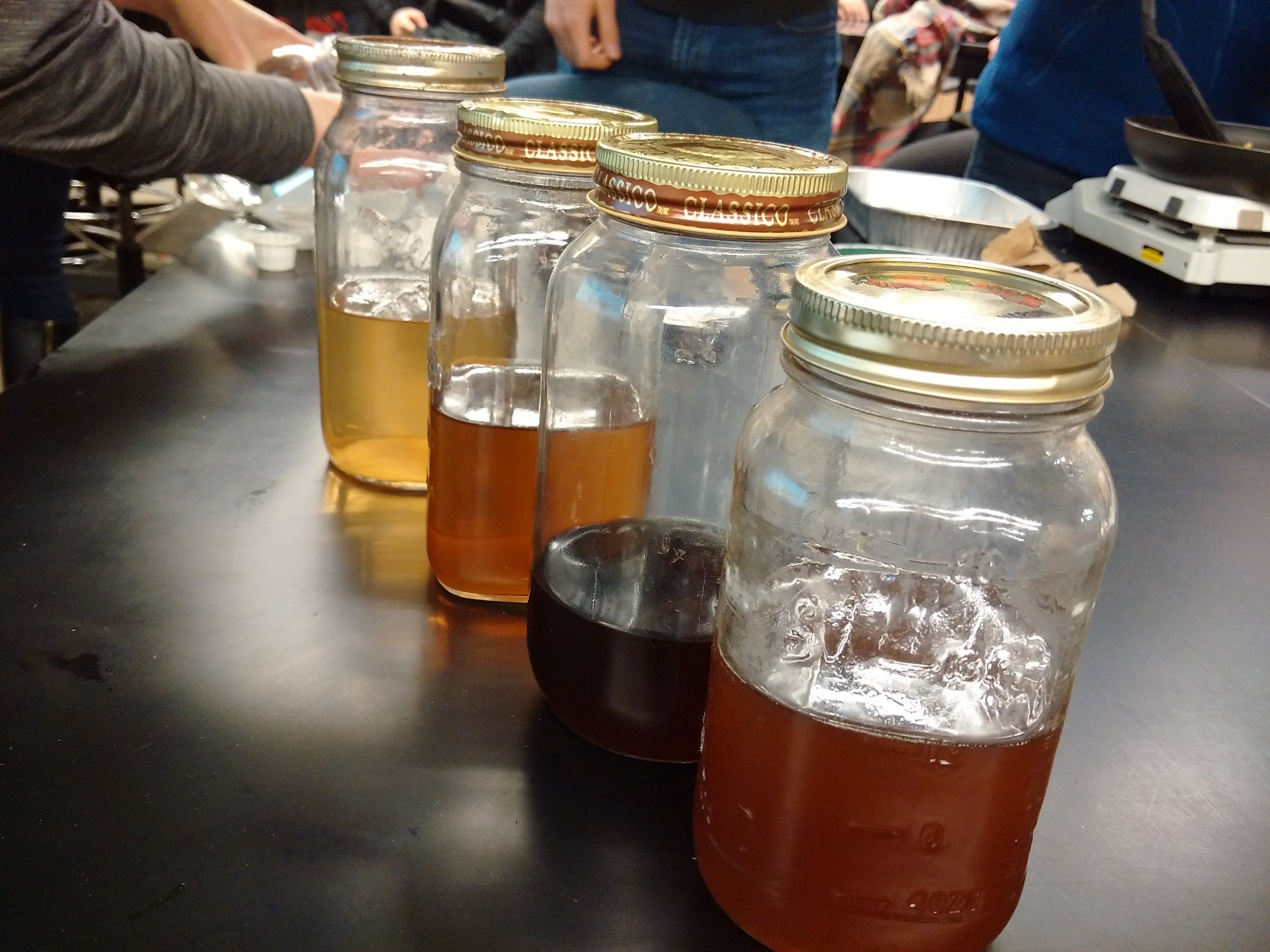Editor:
Brandon Sweet
University Communications
bulletin@uwaterloo.ca
#AskAPharmacist - Questions answered every Tuesday and Thursday
A message from the School of Pharmacy.
March is Pharmacist Awareness month! To celebrate, the School of Pharmacy is hosting "Ask a Pharmacist," a video series where Waterloo's pharmacist faculty and staff answer questions that the public submitted in February.
Today’s episode answers:
- Can your pharmacist prescribe you anything, or do you always need to see a doctor first?
- Can you do anything to lower your chances of getting osteoporosis?
Get the answers here:
New questions and answers are coming on Thursday.
How sweet it is as maple syrup flows on campus

The Faculty of Environment’s Ecology Lab hosted a maple syrup workshop last week where attendees learned all about maple syrup collection and production. Seasoned maple syrup producer Rachel Greene and Ryan Deska led the workshop.
The attendees learned that sugar maple is the ideal tree to tap as it has the lowest ratio of water to sugar (40:1) compared to other species of maple (up to 60:1). Although birch and black walnut trees can be tapped, yellow birch syrup is not appealing to our taste palate like the sweetness of sugar maple and the ratio of water to sugar in Black walnut is too high to be feasible. Several maples were tapped in the V1 campus woodlot. The collected sap was boiled down and all were able to enjoy pancakes and syrup, maple taffy even the pure maple sap!

In order for maple sap to flow, it is entirely weather dependent. The daytime temperatures must be no higher than 4°C in the daytime with nighttime temperatures dipping to -4°C, hence this production is limited to only a few regions in North America. Quebec produces 77 per cent of all maple syrup globally, and 94 per cent of Canada’s total production. The amount of syrup is approximately 8 million litres a year, resulting in $610 million in GDP and 12,000 jobs in rural regions.
Climate change is impacting maple syrup production in Canada, shifting the maple’s growing range northwards, affecting sap flows with fluctuating weather and the pH of soil also affecting tree health.
Pascal Lectures to ask big questions about small things

This year's Pascal Lectures on Christianity and the University will feature Professor James Tour of Rice University. During his lectures, Professor Tour will explore the intersection of nanotechnology and the Christian faith.
Professor Tour is a synthetic organic chemist with more than 590 research publications to his name. He received his Bachelor of Science degree in chemistry from Syracuse University, his Ph.D. in synthetic organic and organometallic chemistry from Purdue University, and postdoctoral training in synthetic organic chemistry at the University of Wisconsin and Stanford University.
The schedule of public lectures and seminars is as follows:
- The Nanotechnologist and God. Wednesday, March 2, 7:30 p.m., STC1012.
- The Origin of Life: An Inside Story. Thursday, March 3, 7:30 p.m., STC1012.
- Nanotech: from Science to Industry. Thursday, March 3, 9:30 a.m., AL113 (seminar)
- Propelling your Career. Thursday, March 3, 2:30 p.m., PHYS 145. (seminar)
The Pascal Lecture series was established to create a forum for Christian issues in an academic environment by inviting outstanding individuals who have distinguished themselves in areas both of scholarly endeavour and of Christian thought or life. It is financed by donations and royalties from published lectures. Pascal Lectures have been taking place on campus on a regular basis since 1978.
The series is named after Blaise Pascal (1632-1662), a French academic and Christian, best remembered as a forerunner of Newton in the establishment of calculus. Pascal was also the author of the Christian meditation, Les Pensées.
Nutrition Month facts return and other notes
March has arrived, like a lion if the weather reports hold up, and today is the first day of National Nutrition Month. Dietitians of Canada are providing inspiration for making healthy choices in the 100 meals most Canadians will consume this month. The 2016 campaign, Take a 100 Meal Journey, is dedicated to encouraging people to make a small change, one meal at a time. Take the pledge and receive daily tips from Registered Dietitians, Canada’s must trusted food and nutrition experts.
With the arrival of National Nutrition Month comes the return of the daily Nutrition "Myth vs. Fact" feature.
"Beginning tomorrow, I will once again tackle some controversial and confusing nutrition-related questions that have been in the news or that I am commonly asked," writes Health Services Dietician Sandy Ace. "Check the Daily Bulletin each weekday in March to learn about nutrition myths and find out what scientific evidence really tells us."
You are welcome to forward comments to Sandy Ace by sending an e-mail to sace@uwaterloo.ca.
Human Resources is reporting that the following staff members retire effective March 1:
- Elizabeth Gerber, who started at the University in December 1990 and retires as a Cook at Conrad Grebel University College;
- Jenny MacIntyre, who joined Waterloo in February 1986 and retires as Manager, External and Safety Services in Housing and Residences;
- Louise Porter, who started working at the University in June 1999 and retires as Undergrad and Grad Programs Assistant in the Psychology department;
- Judy McTaggart, who started her career at Waterloo in September 1970, retiring as Library Associate, Information Services Delivery Co-ordinator in the Library;
- Roger Lycke, who joined Waterloo in September 1970 and retires as Network Support Specialist in IST;
- Wolfgang Dandyk, who started at the University in May 1976 and retires as Computer Systems Technician in the Library; and
- William Carroll, who began working at Waterloo in November 1981, retiring as Controls Supervisor in Plant Operations.
In addition, the following faculty have retired effective March 1:
- Ramon Aravena, who started at the University in September 1987, retires as Research Professor in Earth and Environmental Sciences; and
- Robert Shipley, who joined Waterloo in July 1997, and retires as Associate Professor in the School of Planning.
Congratulations to all, and enjoy your retirement!
Upcoming Science Undergraduate Office closures
Please note the following Science Undergrad Office (SUO) closures:
- Wednesday, March 2, opening later, at 10:00 a.m., due to staff training
- Thursday, March 3, closing earlier, at 3:30 p.m., due to a faculty event
"We apologize for any inconvenience this may cause," says the note from Science. "The SUO is located in STC 2031. Check the SUO webpage for regular office hours. Don't forget to sign up for our drop-in hours!"
Link of the day
25 years ago: The Silence of the Lambs
When and where
New Media Services Open House, Tuesday, March 1, 10:30 a.m. to 3:30 p.m., General Services Complex 1167.
Gender and Equity Scholarship Series, “Gendered or neutral? Considering the language of human-computer interaction,” Tuesday, March 1, 11:30 a.m., MC 5501.
Renison presents a guest lecture featuring Director-General Rong Chuan Wu, Taipei Economic and Cultural Office, Toronto, “Taiwan’s Foreign Policy,” Tuesday, March 1, 2:30 p.m., REN 2106.
WatRISQ Seminar featuring Motoh Tsujimura, Associate Professor of Operations Research, Faculty of Commerce, Doshisha University, Japan, “Assessing Capital Investment Strategy under Ambiguity,” Tuesday, March 1, 4:00 p.m., DC 1304.
TheGROOVE, Tuesday, March 1, 5:00 p.m., CPH-3607. Contact Cindy Howe for more information.
The Pass System: film screening and speaker event, Tuesday, March 1, 7:00 p.m.
Velocity Start presents Larry Smith, "The World's Top 10 Commercial Problems," Tuesday, March 1, 7:00 p.m., Velocity Start, South Campus Hall.
Sawatsky Lecture featuring Sir James MacMillan, “The Spiritual in Music,” Tuesday, March 1, 7:30 p.m., Conrad Grebel chapel.
Advisor Coffee Chat: Housing and Residence Life, Wednesday, March 2, 8:45 a.m., DC 1302.
theGROOVE, Wednesday, March 2, 12:10 p.m., CPH-3607. Contact Cindy Howe for more information.
Noon Hour Concert: Afternoon’s Night Music, Wednesday, March 2, 12:30 p.m., Conrad Grebel chapel.
Pursue a part-time or on-line degree at Waterloo, Graduate programs, Wednesday, March 2, 12:00 p.m., TC1208.
Chemistry Department Seminar Series featuring Professor Qadir Timerghazin, Department of Chemistry, Marquette University, Milwaukee, WI, “Point-Charge Models of Molecular Electrostatics: The Inherent Ill-Conditioning, Evolutionary Fitting, and Multipolar Force Fields”, Wednesday, March 2, 2:30 p.m., RCH 307.
Velocity Start presents How To Find Your Customers Online, Wednesday, March 2, 7:30 p.m., Velocity Start, SCH 2nd Floor.
Pascal Lectures on Christianity and the University featuring Professor James Tour, Rice University, "The Nanotechnologist & God," Wednesday March 2, 7:30 p.m., STC 1012.
Pascal Lectures on Christianity and the University featuring Professor James Tour, Rice University, "The Origin of Life: An Inside Story," Thursday, March 3, 7:30 p.m., STC 1012.
Knowledge Integration seminar: “A New Index for Predicting Catastrophes: The Science and the Poetry”, featuring Dr. Madhur Anand, School of Environmental Sciences, University of Guelph, Friday, March 4, 2:30 p.m., AL 113.
International Women's Day Dinner, Friday, March 4, 6:00 p.m., Federation Hall.
WIMIn Ideathon, Saturday, March 5 and Sunday, March 6, Hagey Hall.
Conrad Grebel presents The Music of James MacMillan, Sunday, March 6, 3:00 p.m., St. Peter's Lutheran Church, Kitchener.
GLOW 45th Anniversary Week, Monday, March 7 to Friday, March 11.
TheGROOVE, Tuesday, March 8, 5:00 p.m.,CPH-3607. Contact Cindy Howe for more information.
Velocity Start presents Science Brainstorming, Tuesday, March 8, 7:30 p.m., Velocity Start, SCH 2nd Floor.
theGROOVE, Wednesday, March 9, 12:10 p.m., CPH-3607. Contact Cindy Howe for more information.
Noon Hour Concert: Stealth in Concert, Wednesday, March 9, 12:30 p.m., Conrad Grebel chapel.
Retirement Reception for Mary Soulis, Wednesday, March 9, 3:30 p.m. to 6:00 p.m., University Club. Please RSVP to Carrie MacKinnon - cmackinnon@uwaterloo.ca - by Wednesday, March 2
Velocity Start presents Pitch Like A Pro, Wednesday, March 9, 7:30 p.m., Velocity Start, SCH 2nd Floor.
Games Institute presents GI-IGDA Showcase, Thursday, March 10, 6:30 p.m. to 9:30 p.m., East Campus 1.
James E. Curtis Memorial Lecture featuring Chief Wilton Littlechild, Thursday, March 10, 5:00 p.m., Theatre of the Arts.
East Asian Studies presents a guest lecture featuring Philip Seaton, Hokkaido University, “Pop Culture, History and “Contents Tourism” in Japan,” Thursday, March 10, 6:30 p.m., REN 2106.
Bridges Lecture - Mathematics, Music, and Visual Art, Friday, March 11, 7:30 p.m., Siegfried Hall, St. Jerome's University.
Student portal hackathon, Saturday, March 12, 10:00 a.m., STC 0060.
CV tips, Tuesday, March 15, 12:00 p.m., TC 1112.
Institute of Biochemistry and Molecular Biology (I.B.M.B.) Seminar Series featuring Prof. Emeritus Andrew Wong, Systems Design Engineering, University of Waterloo, “Discovering Deep Knowledge from Biosequence Data”, Tuesday, March 15, 3:30 p.m., C2-361.
TheGROOVE, Tuesday, March 15, 5:00 p.m., CPH-3607. Contact Cindy Howe for more information.
TheGROOVE, Wednesday, March 16, 12:10 p.m., CPH-3607. Contact Cindy Howe for more information.
Velocity Fund $5K Qualifier - Night 1, Wednesday, March 16, 7:00 p.m., Quantum-Nano Centre Room 0101.
Velocity Fund $5k Qualifier - Night 2, Thursday, March 17, 7:00 p.m., Quantum-Nano Centre 0101.
Noon Hour Concert: Haydn String Quartet, Friday, March 18, 12:30 p.m., Conrad Grebel chapel.
Noon Hour Concert: Immortal Beloved featuring Colin Ainsworth, tenor and William Aide, piano. Wednesday, March 23, 12:30 p.m., Conrad Grebel chapel.
One click away
- Simon Newman, drowner of bunnies, resigns Mount St. Mary's presidency
- U of T to collect race-based data from students
- How the best board game on the planet was designed
- UK course on migration branded "dangerous"
- Melissa Click fired from Mizzou
- Ontario tuition commentary part I
- Ontario tuition commentary part II
- Ontario tuition commentary part III
- Ontario tuition commentary part IV
- When is free tuition free?
- McGill BDS vote overturned
- McGill principal issues statement opposing BDS